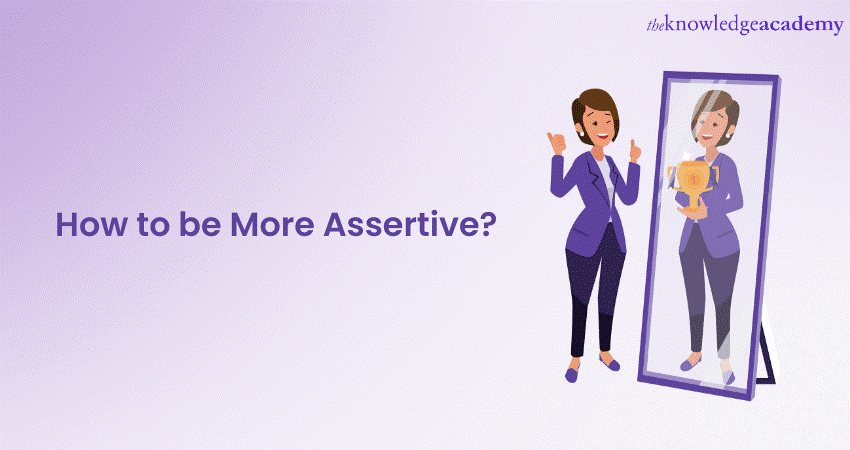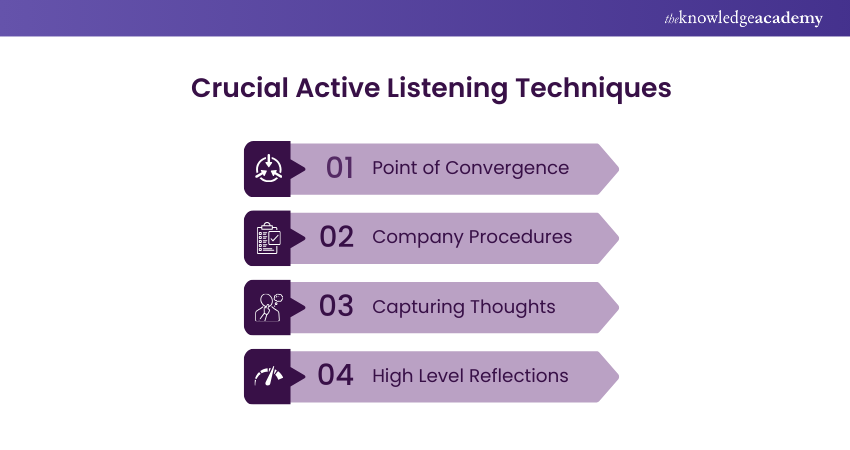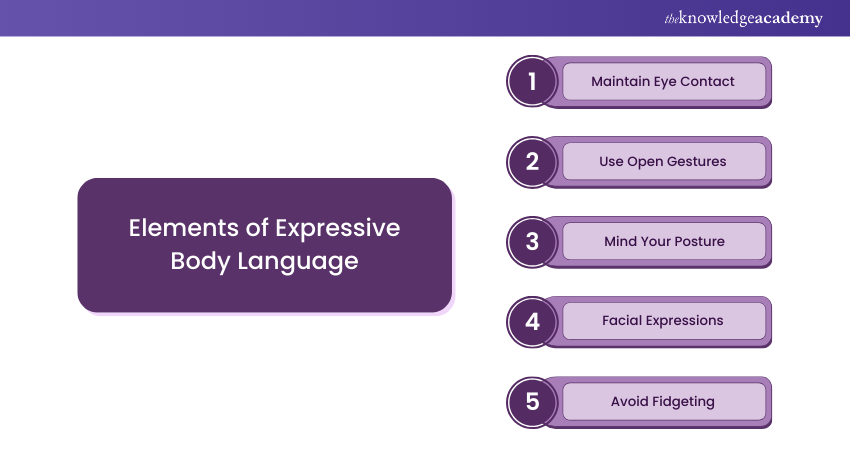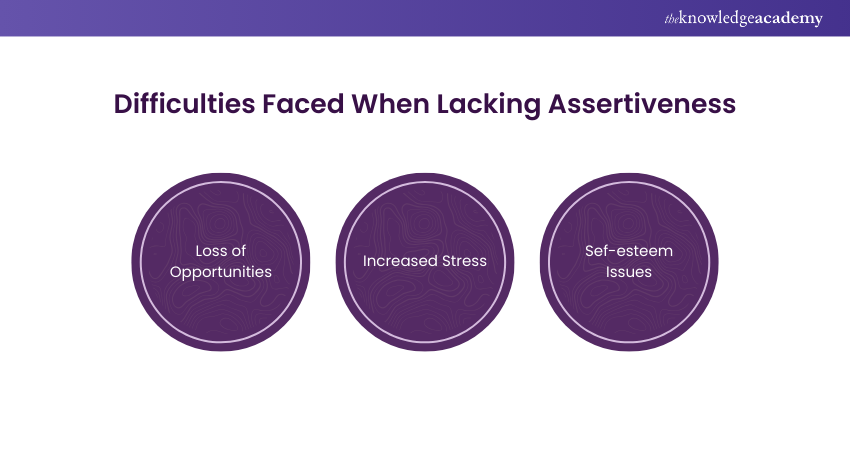We may not have the course you’re looking for. If you enquire or give us a call on +40 316317743 and speak to our training experts, we may still be able to help with your training requirements.
Training Outcomes Within Your Budget!
We ensure quality, budget-alignment, and timely delivery by our expert instructors.

Have you ever gotten yourself in a situation, that you could have avoided if you just said no? Haven't we all! Well, that can change! No more tolerating things you don't really
have to and complying with people’s unnecessary demands of you. Learning How to be More Assertive, will help you confidently say no when you need to, express how you feel and show people that you are not to be crossed. If you are ready to step into your boss era, read along and explore the various ways you can be more Assertive!
Table of Contents
1) What is Assertiveness?
2) Learning How to be More Assertive
3) Benefits of Being Assertive
4) Drawbacks of Being Less Assertive
5) Conclusion
What is Assertiveness?
Assertiveness is the ability to communicate and stand up for oneself in a direct, honest, and respectful manner. It involves expressing your thoughts, feelings and needs confidently while acknowledging the rights of others.
Assertive individuals can maintain their self-esteem without infringing on others' rights. This type of Communication promotes open and honest interactions, promoting better relationships and reducing misunderstandings. There are various Advantages of Assertiveness. Embracing it empowers individuals to voice their opinions and desires while valuing the perspectives and boundaries of those around them.

Learning How to be More Assertive
To be Assertive is an important for Effective Communication and self-expression. It boosts self-esteem, nurtures healthy relationships, and reduces stress. It empowers individuals to advocate for themselves, make confident decisions, and achieve greater success in personal and professional endeavours. Here are some tips to help you learn How to be Assertive:
1) Assess Your Style of Communication
If you want to become more Assertive, you must begin by noticing how you communicate with others. Notice how you voice out your opinions and feelings to others and if there is any difference between them.
Assess if your communication style is passive, i.e., others' opinions and feelings are put first before you can put yours. If so happens, then you can try to improve this by putting your opinions and feelings without hurting others. On the other hand, if your communication style is aggressive, then you can tone down the way you speak, as it may appear that you are trying to bully or dominate the conversation with the person in front of you. Since these two are the two extremes of the spectrum, you can try to find a middle ground in that spectrum and enhance your communication style.
2) Effective Use of "I" Statements
Mastering the art of using "I" statements is crucial in Assertive communication. You create an open and constructive dialogue by expressing your feelings and thoughts without placing blame. Phrases like "I feel" or "I think" shift the focus to your emotions and perspectives, reducing defensiveness in others and encouraging a more receptive atmosphere for communication.
When you employ "I" statements, you take ownership of your thoughts and opinions, empowering yourself to share them confidently without causing unnecessary conflict. This skill strengthens connections with others, as it encourages active listening and validates everyone's unique experiences, promoting understanding and mutual respect in various interactions.
Enhance your ability to connect, persuade, and lead with our Communication Skills Courses – join us today!
3) Active Listening Techniques
Active listening is a fundamental aspect of Assertiveness. By fully engaging in the conversation and giving undivided attention to others' concerns, you demonstrate respect and understanding. This act of active listening validates their feelings and perspectives, creating a supportive and empathetic environment for communication. Acknowledging their emotions and experiences develops a sense of trust and openness, enabling deeper connections in personal and professional relationships.

Through active listening, you not only absorb information but also validate the speaker's thoughts, which promotes constructive dialogue and strengthens the foundation for assured interactions. This powerful skill enhances communication, paving the way for healthier, more meaningful, and mutually beneficial exchanges with others.
4) Assertively saying "no"
Confidently saying "no" is a crucial aspect of Assertiveness. It enables you to maintain personal boundaries and protect your well-being. Politely declining requests that don't align with your values or priorities empowers you to prioritise your needs without unnecessary conflict.
Embracing such Assertiveness Skill allows you to avoid over-commitment and establish a healthy balance in your life. By setting clear limits and respectfully expressing your decision, you assert your autonomy and communicate your values effectively. Saying "no" confidently strengthens your self-confidence and demonstrates that you value your time and resources. It is an empowering tool that promotes self-respect while building authentic and respectful connections with others.
Learn techniques to express yourself clearly and persuasively – Sign up for our Effective Communication Skills Training today!
5) Practice With People you Trust
Whenever there is a big event or a situation in your office or in your personal life, you have to keep in mind, how you convey your thoughts and regulate your emotions. If you want to be more Assertive without being rude or hurtful, you can try practicing with people who you know and trust. Their constructive criticisms will allow you to see the errors in your communication style.
While you are practising speaking with them, also focus on your body language and your tone. Regulating your voice makes a huge impact on the kind of impression that you want to have on people. Therefore, while communicating, you need to see if your body language is becoming shy or hostile, and according to that, try to adjust your approach.
6) Use Body Language
To learn How to be More Assertive, you have to enhance your body language. Communicating fluently, and controlling your tone is not enough. Your body language plays a big role in you being more Assertive. You need to have confidence and show the same while you are speaking.

Maintain a steady eye contact and keep your expressions neutral or controlled. Showing too much anger or happiness or sadness, may not create the impact that you may be looking for. Avoid crossing your arms or legs as that might come that you are being defensive or trying to dominate the person in front. Look at how your body reacts while you speak.
7) Be Positive
Before you want to become Assertive, you need have a positive thought process. You need to talk to yourself positively and build your confidence, even if you are not feeling confident.
You must mentally prepare yourself, before you present your thoughts, if you want to be received in the way that you intend to. If you understand yourself and let yourself know that you can overcome any situation, that can give you an extra boost of confidence.
Looking for assertiveness tips? Check out our Books on Assertiveness!
8) Establish Clear Boundaries
Setting clear boundaries is a vital skill in Assertiveness. It involves effectively communicating your limits and expectations to others. By doing so, you create a framework that safeguards your well-being and promotes healthier relationships. When you establish and uphold these boundaries confidently, you assert your needs and values, promoting mutual respect and understanding.
This skill allows you to navigate interactions with clarity and ensure that your boundaries are respected, contributing to a more balanced and fulfilling life. Learning to set clear boundaries is foundational in cultivating confidence and building healthier connections with others.
Discover strategies to communicate effectively in any business setting – join our Business Communication Course today!
11) Start Small
When learning new skills, it is essential to start with low-risk situations to build your confidence. You can practice with a partner or friend before applying your skills in a more challenging environment, such as at work. After each practice session, take a moment to evaluate your performance and accordingly adjust your approach. This will help you fine-tune your skills and become more effective in future situations.
Gain confidence, improve communication, and assert yourself effectively with our Assertiveness Skills Course. Join today!
Benefits of Being Assertive
There are many benefits of channelling a confident tone and body language. Some of the benefits are as follows:
1) Improved communication
Assertiveness enhances communication by promoting clarity and understanding. When you express yourself confidently and honestly, you reduce the likelihood of misunderstandings and misinterpretations. Clear communication fosters better connections with others and creates a more positive and open environment for dialogue.
Learn to speak your heart confidently with our Communication Skills Training!
2) Enhanced self-confidence
When you assert yourself, you recognise your worth and validate that your thoughts and feelings are important. This newfound self-assurance empowers you to take on new challenges, set and achieve goals, and pursue personal growth with greater determination.
3) Strengthened Relationships
Assertiveness strengthens relationships by building trust and mutual respect. When you communicate openly and confidently, you show others that you value their opinions and feelings while also expressing your own. This healthy communication style creates a foundation of trust, leading to more authentic and fulfilling connections with friends, family, and colleagues.
4) Reduced Stress and Anxiety
Practising Assertiveness can significantly reduce stress and anxiety. When you express yourself boldly, you release pent-up emotions and avoid bottling up feelings. This emotional release contributes to better mental well-being and a sense of relief. Additionally, Assertiveness allows you to set boundaries and avoid taking on excessive responsibilities, leading to a more balanced and less overwhelming lifestyle. By addressing conflicts constructively and standing up for yourself, you can experience reduced anxiety and a greater sense of control over your life.
Drawbacks of Being Less Assertive
You may have a number of reasons to be non-assertive, it could be fear of the person, situation or of the consequences. However, not being Assertive can come with a lot of drawbacks. So, here are some the reasons you should practice being more assertive:

a) When you are non-assertive , you might miss out great opportunities that come your way because you didn’t speak up. This could a simple upgrade on your flight while traveling or a promotion at work that would be a shame to miss out on.
b) Not being Assertive may lead you to stressful situations that you could have avoided if you simply said 'No'.
c) Not being able to stand up for yourself can lead to negative ideation of self. This over time is likely to give you self-esteem issues
Enhance your confidence and communication - sign up for Assertiveness Skills Training now!
Conclusion
We hope you read this blog and understand How to be More Assertive. Assertiveness is about finding your voice and standing up for yourself with confidence and respect. By practising clear communication and setting healthy boundaries, you can improve your relationships and achieve goals. So, practice assertiveness and watch your personal and professional life flourish!
Speak with confidence and authority by signing up for our Public Speaking Course – register today!
Frequently Asked Questions

To develop Assertiveness effectively, practice clear, direct communication, and set firm boundaries. Use statements That include the "I" to express feelings and needs without blaming others. Listen actively, showing respect for differing opinions. Role-play various scenarios to build confidence and seek feedback. Stay calm and assertive, not aggressive, in interactions.

Assertiveness in leadership fosters clear communication, decisive action, and respect. It helps in setting boundaries, managing conflicts, and expressing needs effectively. Assertive leaders inspire trust by balancing firmness and empathy, enabling them to guide teams confidently, encourage open dialogue, and make informed decisions.

The Knowledge Academy takes global learning to new heights, offering over 30,000 online courses across 490+ locations in 220 countries. This expansive reach ensures accessibility and convenience for learners worldwide.
Alongside our diverse Online Course Catalogue, encompassing 17 major categories, we go the extra mile by providing a plethora of free educational Online Resources like News updates, Blogs, videos, webinars, and interview questions. Tailoring learning experiences further, professionals can maximise value with customisable Course Bundles of TKA.

The Knowledge Academy’s Knowledge Pass, a prepaid voucher, adds another layer of flexibility, allowing course bookings over a 12-month period. Join us on a journey where education knows no bounds.

The Knowledge Academy offers various Communication Skills Course, including Assertiveness Skills Training, Effective Communication Skills Course, and Public Speaking Course. These courses cater to different skill levels, providing comprehensive insights into Effective Communication methodologies.
Our Business Skills Blogs covers a range of topics related to Assertiveness, offering valuable resources, best practices, and industry insights. Whether you are a beginner or looking to advance your communication skills, The Knowledge Academy's diverse courses and informative blogs have you covered.
Upcoming Business Skills Resources Batches & Dates
Date
 Public Speaking Course
Public Speaking Course
Fri 28th Feb 2025
Fri 11th Apr 2025
Fri 27th Jun 2025
Fri 22nd Aug 2025
Fri 24th Oct 2025
Fri 28th Nov 2025







 Top Rated Course
Top Rated Course


 If you wish to make any changes to your course, please
If you wish to make any changes to your course, please


